Analysis of Socially Responsible Investing in the Finance Sector
VerifiedAdded on 2022/09/15
|6
|1040
|20
Report
AI Summary
This report examines Socially Responsible Investing (SRI) within the finance sector, focusing on strategies for banks and financial institutions to enhance SRI practices. It explores the influence of millennials and their growing interest in sustainable investments, as well as the impact of SRI on institutional investors. The report further analyzes how the current economic downturn, driven by the Coronavirus, might alter the outlook for stakeholders involved in or considering SRI. The analysis includes a discussion of criteria for making socially responsible investment decisions, emphasizing the importance of social and environmental analysis, ethical considerations, and regulatory compliance. It also contrasts contractual self-regulation with public disclosure, assessing their effectiveness in promoting corporate social responsibility and ethical behavior. The report references several sources to support the arguments and provide a comprehensive overview of SRI in the financial landscape.
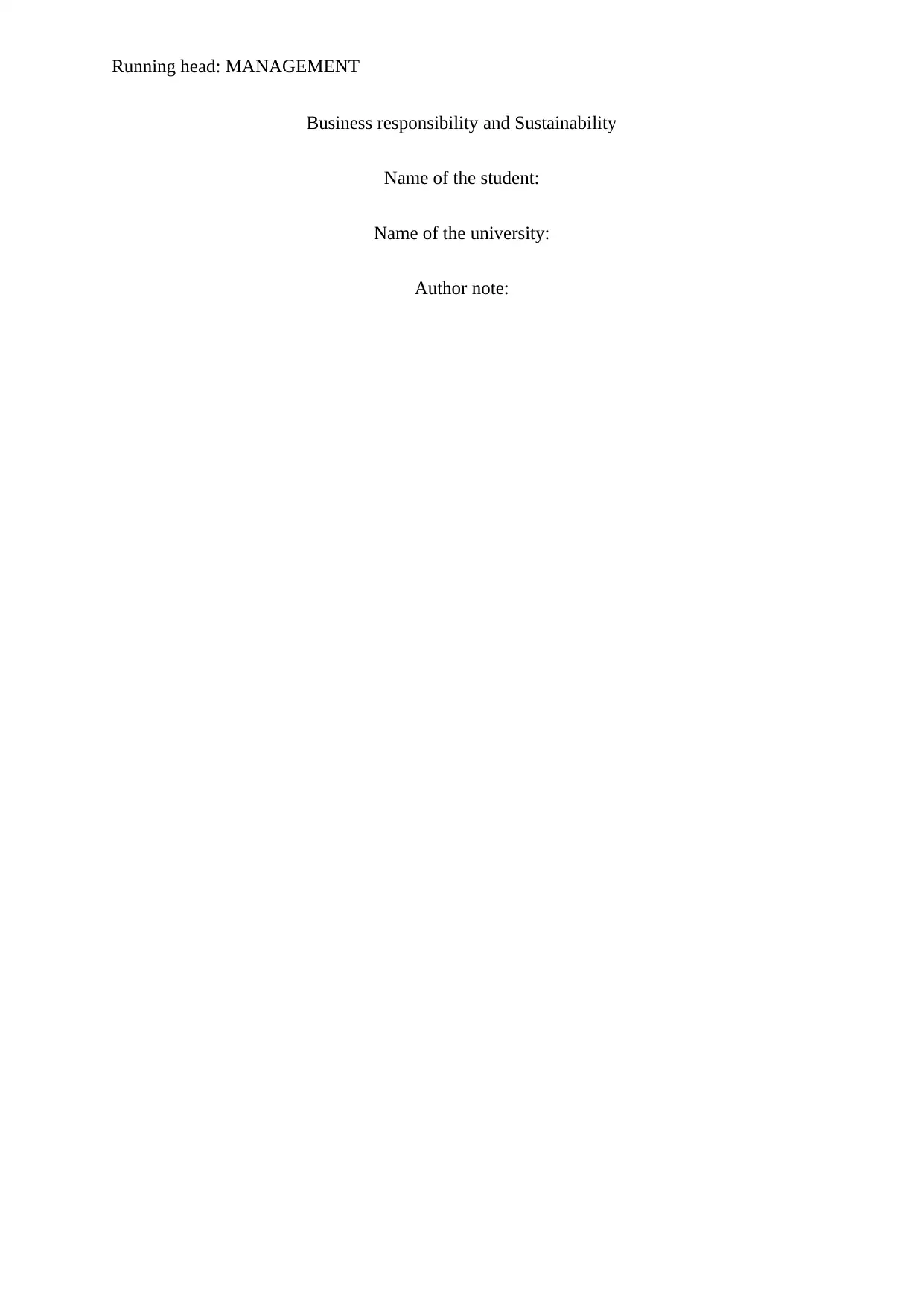
Running head: MANAGEMENT
Business responsibility and Sustainability
Name of the student:
Name of the university:
Author note:
Business responsibility and Sustainability
Name of the student:
Name of the university:
Author note:
Paraphrase This Document
Need a fresh take? Get an instant paraphrase of this document with our AI Paraphraser
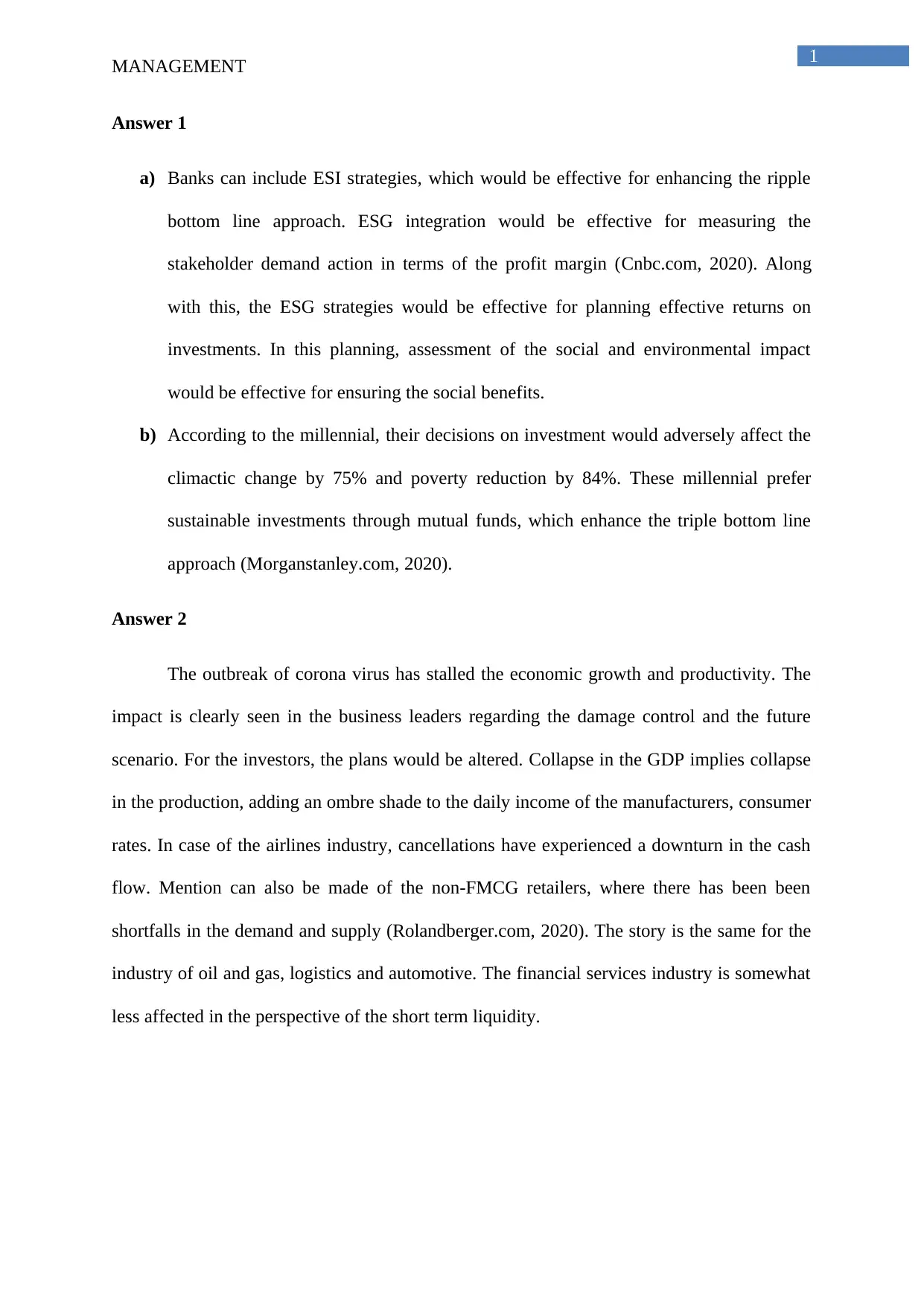
1
MANAGEMENT
Answer 1
a) Banks can include ESI strategies, which would be effective for enhancing the ripple
bottom line approach. ESG integration would be effective for measuring the
stakeholder demand action in terms of the profit margin (Cnbc.com, 2020). Along
with this, the ESG strategies would be effective for planning effective returns on
investments. In this planning, assessment of the social and environmental impact
would be effective for ensuring the social benefits.
b) According to the millennial, their decisions on investment would adversely affect the
climactic change by 75% and poverty reduction by 84%. These millennial prefer
sustainable investments through mutual funds, which enhance the triple bottom line
approach (Morganstanley.com, 2020).
Answer 2
The outbreak of corona virus has stalled the economic growth and productivity. The
impact is clearly seen in the business leaders regarding the damage control and the future
scenario. For the investors, the plans would be altered. Collapse in the GDP implies collapse
in the production, adding an ombre shade to the daily income of the manufacturers, consumer
rates. In case of the airlines industry, cancellations have experienced a downturn in the cash
flow. Mention can also be made of the non-FMCG retailers, where there has been been
shortfalls in the demand and supply (Rolandberger.com, 2020). The story is the same for the
industry of oil and gas, logistics and automotive. The financial services industry is somewhat
less affected in the perspective of the short term liquidity.
MANAGEMENT
Answer 1
a) Banks can include ESI strategies, which would be effective for enhancing the ripple
bottom line approach. ESG integration would be effective for measuring the
stakeholder demand action in terms of the profit margin (Cnbc.com, 2020). Along
with this, the ESG strategies would be effective for planning effective returns on
investments. In this planning, assessment of the social and environmental impact
would be effective for ensuring the social benefits.
b) According to the millennial, their decisions on investment would adversely affect the
climactic change by 75% and poverty reduction by 84%. These millennial prefer
sustainable investments through mutual funds, which enhance the triple bottom line
approach (Morganstanley.com, 2020).
Answer 2
The outbreak of corona virus has stalled the economic growth and productivity. The
impact is clearly seen in the business leaders regarding the damage control and the future
scenario. For the investors, the plans would be altered. Collapse in the GDP implies collapse
in the production, adding an ombre shade to the daily income of the manufacturers, consumer
rates. In case of the airlines industry, cancellations have experienced a downturn in the cash
flow. Mention can also be made of the non-FMCG retailers, where there has been been
shortfalls in the demand and supply (Rolandberger.com, 2020). The story is the same for the
industry of oil and gas, logistics and automotive. The financial services industry is somewhat
less affected in the perspective of the short term liquidity.
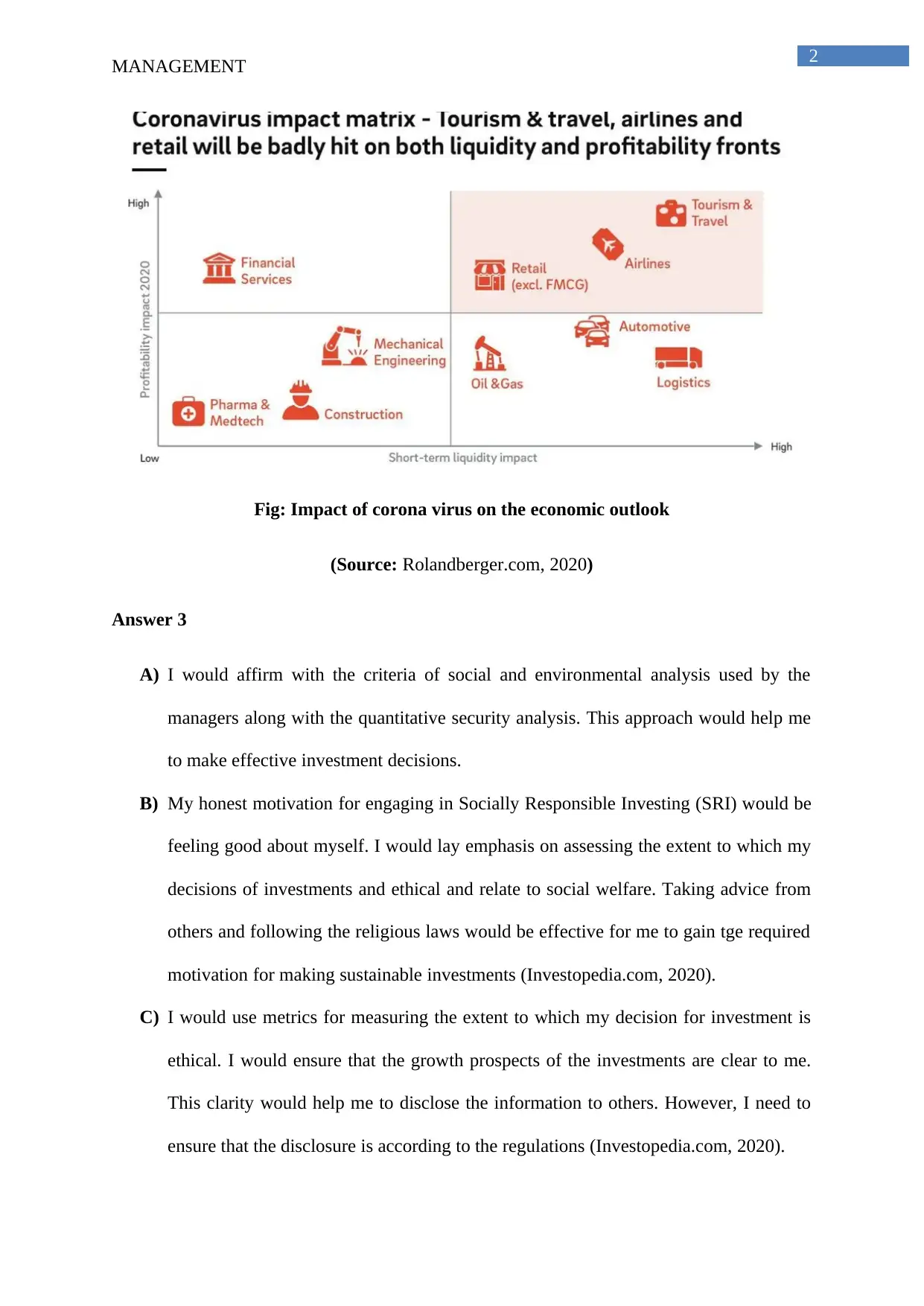
2
MANAGEMENT
Fig: Impact of corona virus on the economic outlook
(Source: Rolandberger.com, 2020)
Answer 3
A) I would affirm with the criteria of social and environmental analysis used by the
managers along with the quantitative security analysis. This approach would help me
to make effective investment decisions.
B) My honest motivation for engaging in Socially Responsible Investing (SRI) would be
feeling good about myself. I would lay emphasis on assessing the extent to which my
decisions of investments and ethical and relate to social welfare. Taking advice from
others and following the religious laws would be effective for me to gain tge required
motivation for making sustainable investments (Investopedia.com, 2020).
C) I would use metrics for measuring the extent to which my decision for investment is
ethical. I would ensure that the growth prospects of the investments are clear to me.
This clarity would help me to disclose the information to others. However, I need to
ensure that the disclosure is according to the regulations (Investopedia.com, 2020).
MANAGEMENT
Fig: Impact of corona virus on the economic outlook
(Source: Rolandberger.com, 2020)
Answer 3
A) I would affirm with the criteria of social and environmental analysis used by the
managers along with the quantitative security analysis. This approach would help me
to make effective investment decisions.
B) My honest motivation for engaging in Socially Responsible Investing (SRI) would be
feeling good about myself. I would lay emphasis on assessing the extent to which my
decisions of investments and ethical and relate to social welfare. Taking advice from
others and following the religious laws would be effective for me to gain tge required
motivation for making sustainable investments (Investopedia.com, 2020).
C) I would use metrics for measuring the extent to which my decision for investment is
ethical. I would ensure that the growth prospects of the investments are clear to me.
This clarity would help me to disclose the information to others. However, I need to
ensure that the disclosure is according to the regulations (Investopedia.com, 2020).
⊘ This is a preview!⊘
Do you want full access?
Subscribe today to unlock all pages.

Trusted by 1+ million students worldwide
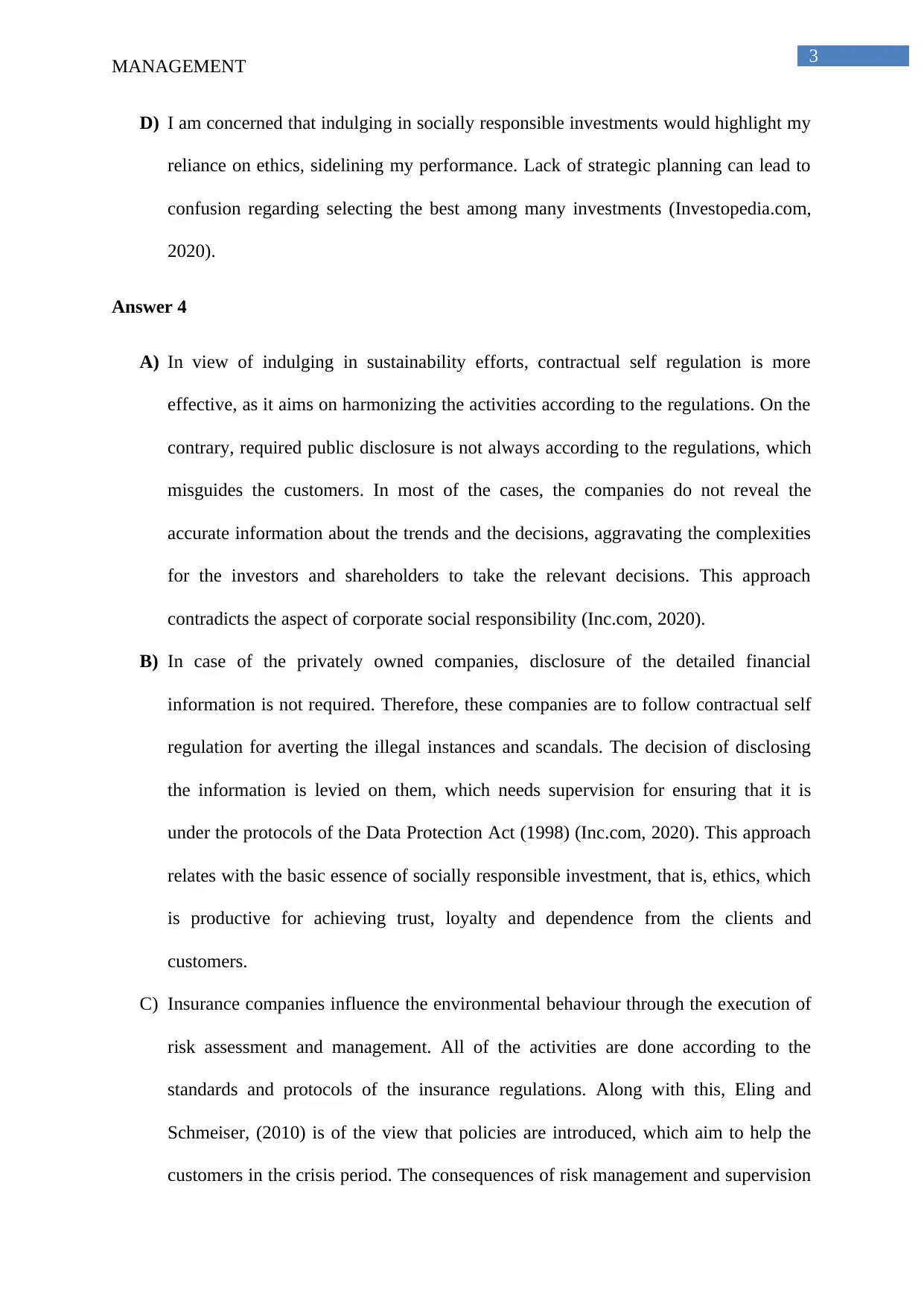
3
MANAGEMENT
D) I am concerned that indulging in socially responsible investments would highlight my
reliance on ethics, sidelining my performance. Lack of strategic planning can lead to
confusion regarding selecting the best among many investments (Investopedia.com,
2020).
Answer 4
A) In view of indulging in sustainability efforts, contractual self regulation is more
effective, as it aims on harmonizing the activities according to the regulations. On the
contrary, required public disclosure is not always according to the regulations, which
misguides the customers. In most of the cases, the companies do not reveal the
accurate information about the trends and the decisions, aggravating the complexities
for the investors and shareholders to take the relevant decisions. This approach
contradicts the aspect of corporate social responsibility (Inc.com, 2020).
B) In case of the privately owned companies, disclosure of the detailed financial
information is not required. Therefore, these companies are to follow contractual self
regulation for averting the illegal instances and scandals. The decision of disclosing
the information is levied on them, which needs supervision for ensuring that it is
under the protocols of the Data Protection Act (1998) (Inc.com, 2020). This approach
relates with the basic essence of socially responsible investment, that is, ethics, which
is productive for achieving trust, loyalty and dependence from the clients and
customers.
C) Insurance companies influence the environmental behaviour through the execution of
risk assessment and management. All of the activities are done according to the
standards and protocols of the insurance regulations. Along with this, Eling and
Schmeiser, (2010) is of the view that policies are introduced, which aim to help the
customers in the crisis period. The consequences of risk management and supervision
MANAGEMENT
D) I am concerned that indulging in socially responsible investments would highlight my
reliance on ethics, sidelining my performance. Lack of strategic planning can lead to
confusion regarding selecting the best among many investments (Investopedia.com,
2020).
Answer 4
A) In view of indulging in sustainability efforts, contractual self regulation is more
effective, as it aims on harmonizing the activities according to the regulations. On the
contrary, required public disclosure is not always according to the regulations, which
misguides the customers. In most of the cases, the companies do not reveal the
accurate information about the trends and the decisions, aggravating the complexities
for the investors and shareholders to take the relevant decisions. This approach
contradicts the aspect of corporate social responsibility (Inc.com, 2020).
B) In case of the privately owned companies, disclosure of the detailed financial
information is not required. Therefore, these companies are to follow contractual self
regulation for averting the illegal instances and scandals. The decision of disclosing
the information is levied on them, which needs supervision for ensuring that it is
under the protocols of the Data Protection Act (1998) (Inc.com, 2020). This approach
relates with the basic essence of socially responsible investment, that is, ethics, which
is productive for achieving trust, loyalty and dependence from the clients and
customers.
C) Insurance companies influence the environmental behaviour through the execution of
risk assessment and management. All of the activities are done according to the
standards and protocols of the insurance regulations. Along with this, Eling and
Schmeiser, (2010) is of the view that policies are introduced, which aim to help the
customers in the crisis period. The consequences of risk management and supervision
Paraphrase This Document
Need a fresh take? Get an instant paraphrase of this document with our AI Paraphraser
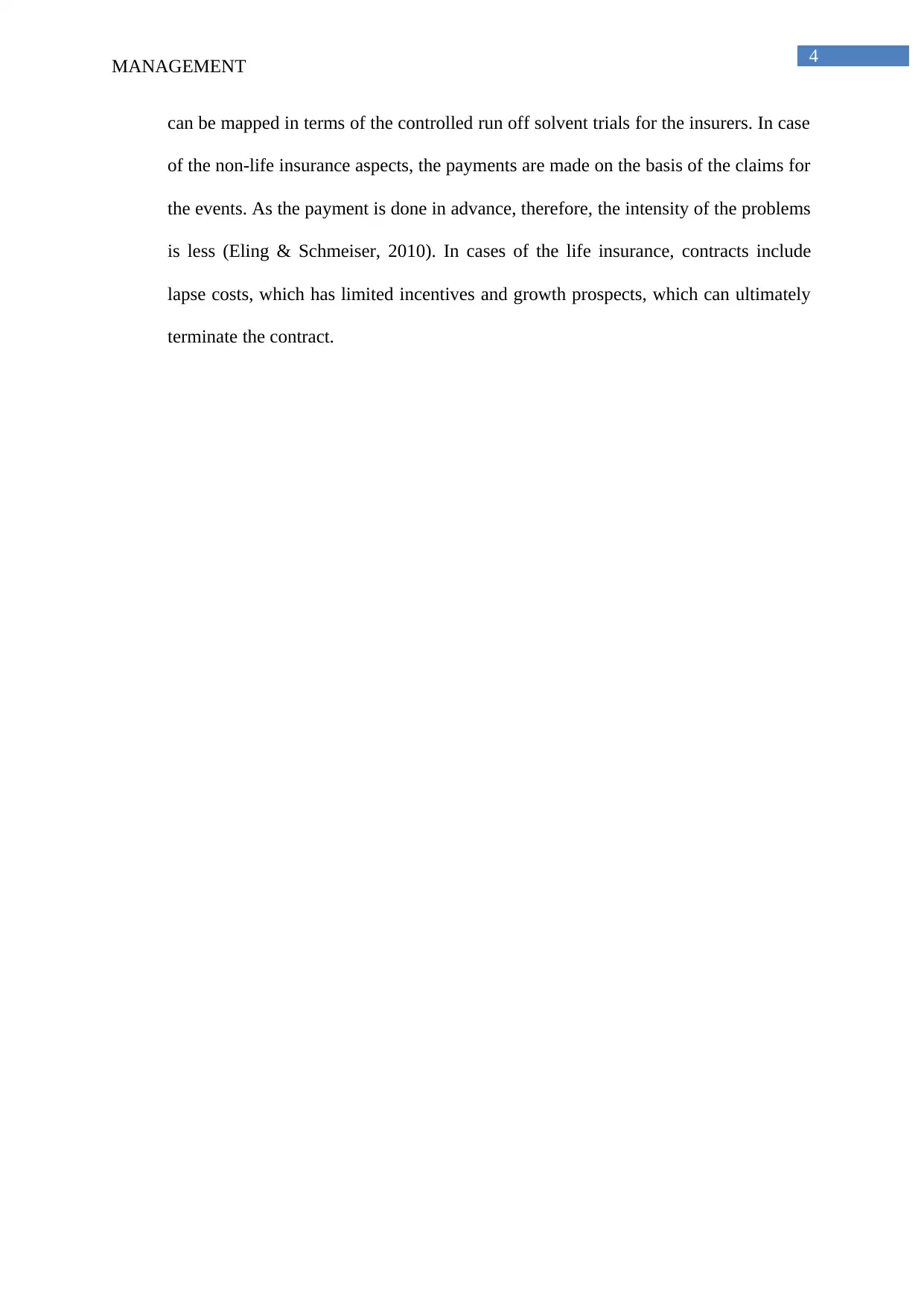
4
MANAGEMENT
can be mapped in terms of the controlled run off solvent trials for the insurers. In case
of the non-life insurance aspects, the payments are made on the basis of the claims for
the events. As the payment is done in advance, therefore, the intensity of the problems
is less (Eling & Schmeiser, 2010). In cases of the life insurance, contracts include
lapse costs, which has limited incentives and growth prospects, which can ultimately
terminate the contract.
MANAGEMENT
can be mapped in terms of the controlled run off solvent trials for the insurers. In case
of the non-life insurance aspects, the payments are made on the basis of the claims for
the events. As the payment is done in advance, therefore, the intensity of the problems
is less (Eling & Schmeiser, 2010). In cases of the life insurance, contracts include
lapse costs, which has limited incentives and growth prospects, which can ultimately
terminate the contract.
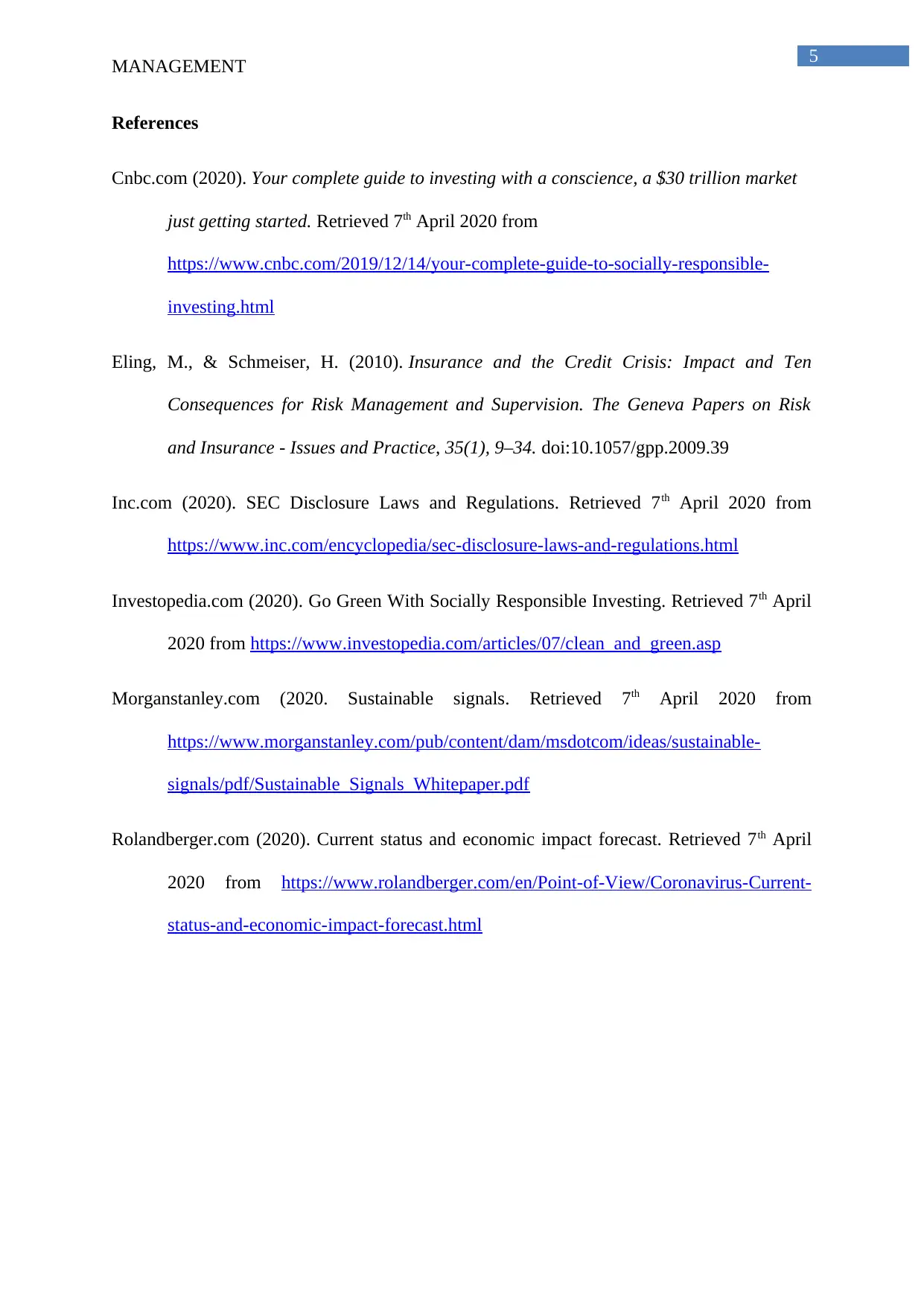
5
MANAGEMENT
References
Cnbc.com (2020). Your complete guide to investing with a conscience, a $30 trillion market
just getting started. Retrieved 7th April 2020 from
https://www.cnbc.com/2019/12/14/your-complete-guide-to-socially-responsible-
investing.html
Eling, M., & Schmeiser, H. (2010). Insurance and the Credit Crisis: Impact and Ten
Consequences for Risk Management and Supervision. The Geneva Papers on Risk
and Insurance - Issues and Practice, 35(1), 9–34. doi:10.1057/gpp.2009.39
Inc.com (2020). SEC Disclosure Laws and Regulations. Retrieved 7th April 2020 from
https://www.inc.com/encyclopedia/sec-disclosure-laws-and-regulations.html
Investopedia.com (2020). Go Green With Socially Responsible Investing. Retrieved 7th April
2020 from https://www.investopedia.com/articles/07/clean_and_green.asp
Morganstanley.com (2020. Sustainable signals. Retrieved 7th April 2020 from
https://www.morganstanley.com/pub/content/dam/msdotcom/ideas/sustainable-
signals/pdf/Sustainable_Signals_Whitepaper.pdf
Rolandberger.com (2020). Current status and economic impact forecast. Retrieved 7th April
2020 from https://www.rolandberger.com/en/Point-of-View/Coronavirus-Current-
status-and-economic-impact-forecast.html
MANAGEMENT
References
Cnbc.com (2020). Your complete guide to investing with a conscience, a $30 trillion market
just getting started. Retrieved 7th April 2020 from
https://www.cnbc.com/2019/12/14/your-complete-guide-to-socially-responsible-
investing.html
Eling, M., & Schmeiser, H. (2010). Insurance and the Credit Crisis: Impact and Ten
Consequences for Risk Management and Supervision. The Geneva Papers on Risk
and Insurance - Issues and Practice, 35(1), 9–34. doi:10.1057/gpp.2009.39
Inc.com (2020). SEC Disclosure Laws and Regulations. Retrieved 7th April 2020 from
https://www.inc.com/encyclopedia/sec-disclosure-laws-and-regulations.html
Investopedia.com (2020). Go Green With Socially Responsible Investing. Retrieved 7th April
2020 from https://www.investopedia.com/articles/07/clean_and_green.asp
Morganstanley.com (2020. Sustainable signals. Retrieved 7th April 2020 from
https://www.morganstanley.com/pub/content/dam/msdotcom/ideas/sustainable-
signals/pdf/Sustainable_Signals_Whitepaper.pdf
Rolandberger.com (2020). Current status and economic impact forecast. Retrieved 7th April
2020 from https://www.rolandberger.com/en/Point-of-View/Coronavirus-Current-
status-and-economic-impact-forecast.html
⊘ This is a preview!⊘
Do you want full access?
Subscribe today to unlock all pages.

Trusted by 1+ million students worldwide
1 out of 6
Related Documents
Your All-in-One AI-Powered Toolkit for Academic Success.
+13062052269
info@desklib.com
Available 24*7 on WhatsApp / Email
![[object Object]](/_next/static/media/star-bottom.7253800d.svg)
Unlock your academic potential
Copyright © 2020–2025 A2Z Services. All Rights Reserved. Developed and managed by ZUCOL.



